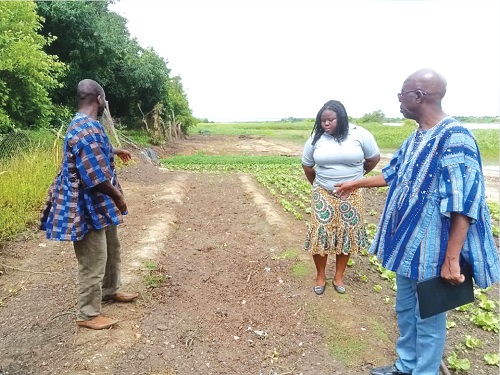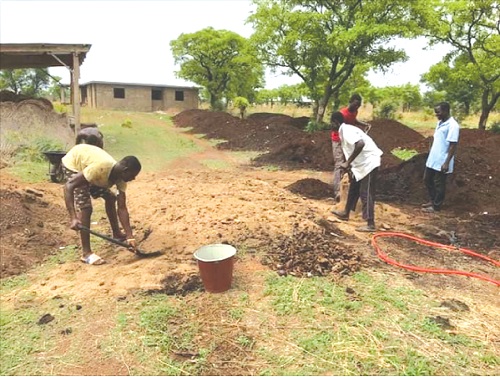
Conservation Agriculture building climate change resilience in Savannah Region
In Northern Ghana, the soil is relatively poor in organic matter and other critical soil nutrients such as nitrogen, potassium and phosphorus.
Advertisement
Worsening the already depleted soil is the continuous tillage of the soil and removal of biomass from the surface of the soil through bushfires and indiscriminate felling of trees.
Also, as temperatures rise, rainfall patterns are becoming more unpredictable and intense.
As a result, planting seasons have become shorter and the proportion of arable land is shrinking.
These challenges are significantly threatening farmers’ productivity and raising fears of possible food insecurity soon.
On the back of this, Conservation Agriculture (CA) system practice has been proven as a strategy to mitigate the effects of climate change and soil degradation and build resilience for a bountiful harvest to feed the nation and even export beyond its borders.
What is CA?
Conservation Agriculture practices are soil management techniques that minimise the disturbance of the soil's structure, conserve soil and water, and enhance biodiversity.
They enhance high crop yields while reducing production costs, maintaining soil fertility and conserving water, as well as achieving sustainable agriculture and improving livelihoods.
Some of the practices include zero tillage, application of organic compost, mulching, and mix and crop rotation, which stimulate soil microorganisms and control pests, weeds and plant diseases.

According to the Food and Agriculture Organisation (FAO), CA is 20 to 50 per cent less labour-intensive and thus contributes to reducing greenhouse gas emissions through lower energy inputs and improved nutrient use efficiency.
At the same time, it stabilises and protects soil from breaking down and releasing carbon into the atmosphere.
Despite its potential, however, the adoption of CA remains low, due in part to the fact that costs are immediate while payoffs are relatively long-term.
In the midst of that, a 50-year-old vegetable farmer at Buipe in the Central Gonja District in the Savannah Region has adopted the system and has been recording good yields for the past 20 years.
Abdul-Waheed Yakubu has been using conservation and organic practices to cultivate about seven acres of vegetables such as green pepper, cabbage, spinach, onions and carrots for the commercial market.
Sharing his experience with the Daily Graphic, he said: “I don’t use chemicals to cultivate my vegetables, rather I use garbage, bat faeces and urine to prepare my organic manure, which is very healthy for consumption.”
“When I clear the land, I don’t burn the grass but I spread them on the land. With that when the grass rots it adds nutrients to the soil and also protects it from erosion and drought while protecting the living organism.
“I don’t also plough the land; I either plant direct into the soil or till the surface of the soil to create beds for the crops,” he explained.
He indicated that the practice was cost-effective as no chemical and tillage was needed for the cultivation of crops.
Mr Yakubu, however, advised farmers against practising slashing and burning of grass on the land, as it would deplete the soil nutrients and destroy the ecosystem.
Another farmer at Walewale, Afa Osman, told the Daily Graphic that despite the rising cost of fertiliser and chemicals, he was able to cultivate his five acres of maize and soya beans farms with ease.
"What I do is that I rotate the crops, so I divide the land into two, so if I plant soya beans on one section this season, the next season I plant maize on the same land, while I shift the soybeans to the other portion of the land.
“I do that because soya beans leaves, nodes and roots generate nitrogen into the soil which is a very key nutrient for the maize plant,” he said.
Greenhouse emissions
A Research Scientist at the Council for Scientific Research (CSR), Plant Genetic Resource Institute at Bonsu, Dr Joseph Bandanaa, in an interview, said organic farming enhanced the biodiversity of the soil and built resilience against climate change.
He noted that “Organic farming and CA in general help to reduce greenhouse emission production; if we use more fertiliser, it means that factories will have to produce more fertiliser for farmers to use, which ends up producing a lot of carbon dioxide.”
Climate resilience
As part of efforts to build resilience against climate change and help boost the food supply chain in the north, the West African Centre for Water, Irrigation and Sustainable Agriculture of the University for Development Studies (WACWISA-UDS) and the Frontier Institute of Development Planning (FIDEP), with funding from the European Union (EU), recently launched an innovative project to develop new agroecological-based practices that will build on existing local and scientific knowledge.

The four-year project being implemented in four African countries, including Ghana, dubbed: “Agroecological Solutions for Resilient Farming in West Africa” (CIRAWA), will work with smallholder farmers to improve food nutrition, local livelihoods and ecosystem health.
It would also enhance biodiversity and improve climate resilience.
The Director of WACWISA-UDS, Professor Felix Abagale, said the project would facilitate the best indigenous farming practices that would go a long way to revolutionise the country’s agricultural system and bring a lot of benefits to the people.
"We are not bringing anything very new. What we are bringing is that we want to come and understand the indigenous ways of doing many things (farming), and as scientists, we do research and improve on what farmers are already doing, which we know is good.
“So, when you are cultivating your vegetables, is there anything we can do to improve it? You are doing composting. Yes, we have scientific methods of doing other things, improving upon composting,” the Regional Coordinator for the CIRAWA project, Prof. Saa Dittoh, said.
Given the growing impact of climate change on livelihoods, he said there was a need to adopt indigenous best practices that could be easily adapted by the people to enhance food production and alleviate poverty.
Way forward
A study conducted by the Environmental Protection Agency (EPA) in 2002 estimated that 69 per cent of the total land surface of the country was prone to severe or very severe soil erosion; the main manifestation of land degradation in the country.
The phenomenon has contributed largely to the continuous decline of food production in the country over the years.
To reverse the trend, it is important for the government and various stakeholders to step up efforts to sensitise and build the resilience of farmers to adopt CA and organic farming practices.
Writer's email:[email protected]




